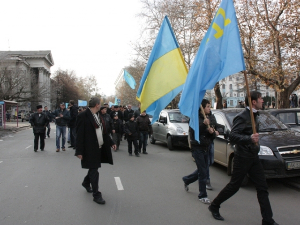Russia in Syria and Putin's geopolitical strategy
By Avinoam Idan
October 22nd, 2015, The CACI Analyst
The deepening of Russia’s military presence in Syria and its direct involvement in aiding the Assad regime during the Syrian crisis is a game changing step in the geostrategic context of the Middle East. This is Russia’s third move during the last eight years to change the strategic status quo in the greater Middle East by means of military force. Russia’s new step in Syria aims to influence the geopolitical makeup of the Middle East following the collapse of the Sykes-Picot order. Russia aims to establish itself as a key player from the Caspian Basin in the east, via the Black Sea, to the Eastern Mediterranean.
Russia's warfare strategy and borderization in Georgia
By George Tsereteli (05/08/2015 issue of the CACI Analyst)
On July 10, Russian military personnel moved border markers further into Georgian territory from the breakaway region of South Ossetia, in the process positioning the new “border” even closer to the strategically vital East-West highway and placing more of the Baku-Supsa pipeline under Russian control. As a result, the Georgian government has been criticized by opposition groups for not doing enough to prevent such incursions, and for not responding adequately. As prescribed by contemporary Russian military doctrine, Russia’s recent actions in Georgia, as well as in other parts of the world, are manifestations of a new warfare strategy.

Moscow and the Crimean Tatars: is Russia Inciting a New Jihadi Front?
By Stephen Blank (08/05/2014 issue of the CACI Analyst)
When Moscow invaded and annexed Crimea, it also reacquired control over the Crimean Tatar population there, approximately 300,000 people. Russia’s annexation is utterly at odds with the desires of the Crimean Tatars and their Majlis or Council. As the veteran Tatar leader Mustafa Dzhemilev has said, they want only autonomy within Ukraine, an insight based on the clear recognition that only in a democratic Ukraine, especially in the light of planned reforms to decentralize Ukraine’s administration, can their demands be met. The record of the treatment of Tatars in Crimea after Russia’s annexation implies that Moscow risks inciting a new insurgency, possibly with Jihadist overtones.







 Silk Road Paper S. Frederick Starr,
Silk Road Paper S. Frederick Starr,  Book Svante E. Cornell, ed., "
Book Svante E. Cornell, ed., "